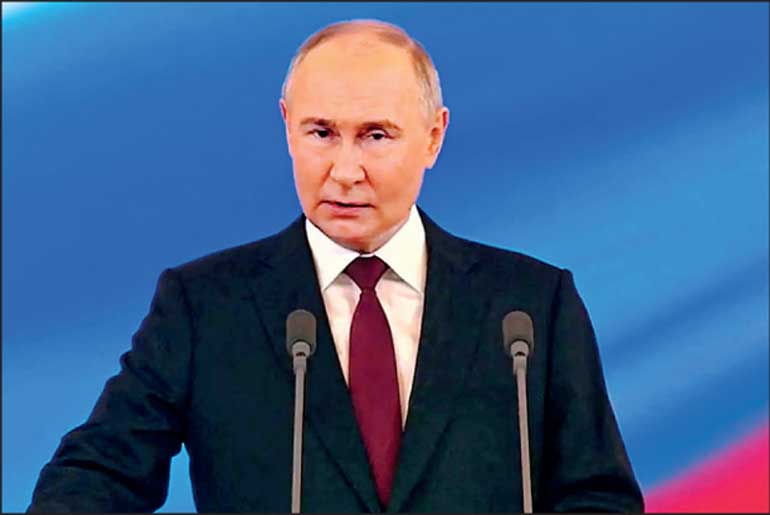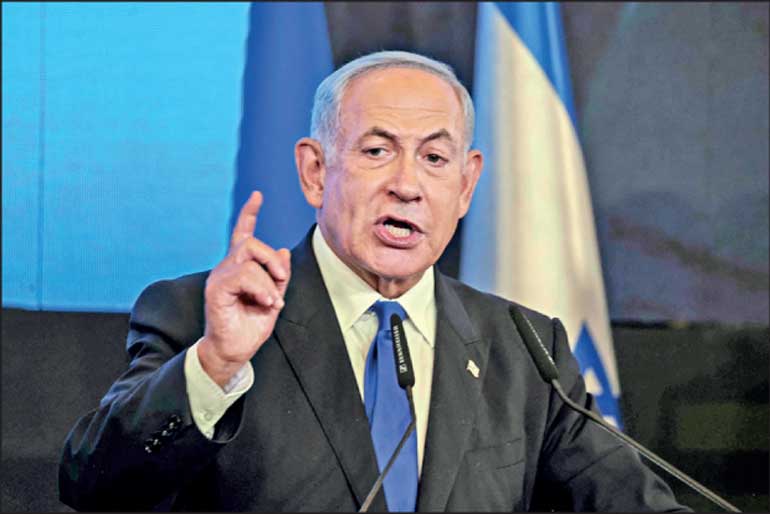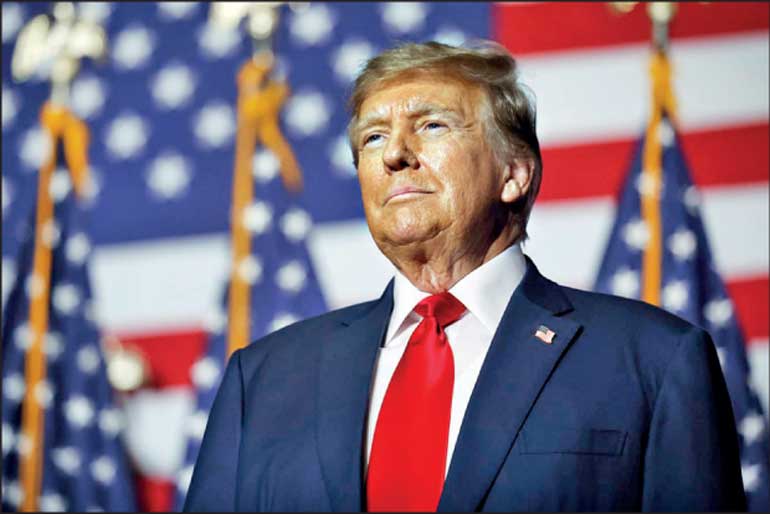Thursday Feb 19, 2026
Thursday Feb 19, 2026
Saturday, 23 August 2025 00:00 - - {{hitsCtrl.values.hits}}

Russian President Vladimir Putin 
Israeli Prime Minister Benjamin Netanyahu US President Donald Trump
US President Donald Trump
 Introduction
Introduction
In the aftermath of the Second World War, the international community sought to build a system that would prevent the recurrence of global catastrophe. The destruction of two world wars had shown that unregulated power politics would only lead to instability, devastation, and endless cycles of revenge. Out of that realisation was born the idea of a rules-based order—an architecture grounded in treaties, legal obligations, and multilateral institutions, where disputes would be resolved by law rather than force, and where smaller nations could coexist with great powers on an equal footing.1
For decades, this framework offered a fragile but functional balance. Yet today, that vision is under siege. Nationalist and supremacy-driven ideologies, embraced by both established and emerging powers, are eroding the very principles those treaties enshrined. Instead of serving as guardrails, treaties are increasingly treated as negotiable conveniences, honoured selectively or ignored entirely when they clash with domestic politics or strategic ambitions.2
The twentieth century produced an unprecedented framework for international cooperation. From the UN Charter to the WTO, from arms control treaties to humanitarian law, these agreements sought to level the playing field and curb the arbitrary exercise of power.3 They were never designed to erase global disparities but to manage them, creating predictability and reducing the chance that disputes would spiral into open conflict.
The promise of treaties
At the heart of the post-war order lay five pillars of international law. The UN Charter of 1945 prohibited wars of aggression, committing states to peaceful dispute resolution and collective security mechanisms.4 It was meant to replace the pre-1945 world, where conquest could still yield sovereignty, with a system of law-backed restraint.
In the economic sphere, the General Agreement on Tariffs and Trade (later institutionalised as the WTO) set predictable rules for global commerce. The principles of non-discrimination and national treatment were intended to prevent trade from being weaponised arbitrarily, ensuring that smaller economies could engage on something resembling a level playing field.5
Territorial integrity was reaffirmed in the Helsinki Final Act of 1975, which declared borders inviolable except by mutual consent.6 This principle sought not only to deter direct invasions but also to delegitimise subtler methods of coercive annexation.
Humanitarian protections were codified in the 1949 Geneva Conventions, which set obligations for the protection of civilians and prisoners in times of war.7 They attempted to humanise conflict by outlawing certain methods and means of warfare.
Arms control treaties, most notably the Nuclear Non-Proliferation Treaty of 1968, were designed to manage the world’s most destructive technologies. Alongside regional alliances such as NATO, these arrangements aimed to reduce uncertainty, increase transparency, and lower the risk of catastrophic miscalculation.
Together, these treaties promised predictability, legal equality, and shared prosperity. They allowed smaller nations to contest violations through courts and arbitration rather than military retaliation. They ensured that economies became interdependent, making stability a common good. But their promise always relied on the political will of the powerful to abide by them—a will that now seems to be ebbing away.
From law to leverage
In recent years, a series of high-profile examples have exposed the erosion of this treaty-based system.
The United States, under Donald Trump, wielded tariffs as a political weapon, invoking “national security” even against long-standing allies. This bypassed the WTO’s dispute resolution process and undermined confidence in multilateral arbitration.8 The Trump administration, for instance, imposed a 50% tariff on Indian goods in response to oil purchases from Russia—while taking no comparable action against China, whose imports were far larger.9 Such selective enforcement gutted the WTO’s principle of non-discrimination and signalled that trade law could be used as a geopolitical cudgel rather than a neutral rulebook.
China has acted no differently in bending rules to its advantage. It has deployed anti-dumping duties not purely to counter unfair pricing, but as political retaliation in unrelated disputes. At the same time, Beijing exports heavily subsidised steel, solar panels, and electronics at below-market rates, distorting global competition.10 The WTO’s subsidy rules theoretically prohibit such practices, but enforcement is inconsistent, as many governments hesitate to confront the world’s second-largest economy.
In the humanitarian domain, Israel’s military actions in Gaza have repeatedly raised allegations of grave breaches of international law. The targeting of civilian infrastructure, restrictions on humanitarian aid, and the use of disproportionate force run counter to the protections codified in the Geneva Conventions.11 Yet accountability has been blocked, not by lack of evidence, but by the diplomatic shield of the United States.12 This has set a dangerous precedent: compliance with humanitarian law depends not on impartial enforcement, but on the political cover a state can muster.
Russia’s conduct in Ukraine remains the starkest violation of all. Its annexation of Crimea in 2014, justified by selective history and a disputed referendum, directly contravened the UN Charter, the Budapest Memorandum, and the Helsinki Final Act.13 That move has since been expanded to encompass further Ukrainian territories, cementing the precedent that borders can be redrawn by force.
Power beyond law
Beyond these well-known examples, there are also states that wield either financial clout or military strength to bend international treaties to their will. Some deploy economic leverage—through aid, investments, or access to markets—to silence criticism and secure exceptions. Others rely on raw military power, knowing that their strategic weight or veto privileges will shield them from accountability. In both cases, money and muscle become tools for eroding the universality of treaties, turning legal obligations into bargaining chips.
The pattern: Power over principle
These cases, though diverse, reveal a consistent pattern. Treaty obligations are observed selectively, depending on political convenience. Legal mechanisms are bypassed, as governments resort to unilateral measures over arbitration. Enforcement is shaped by alliances and geopolitics rather than universal principles. The rules-based order is being hollowed out—not with one decisive blow, but through the steady erosion of credibility.
Conclusion
The erosion of treaties does not yet mean the collapse of the international order. Institutions still function; legal arguments are still made; global trade and diplomacy continue. But the trajectory is unmistakable. The spirit of 1945—that rules could restrain power—is giving way to a new reality where power restrains rules.
If this trajectory continues, the “level playing field” envisioned by the architects of the post-war order will recede into history. What remains will be a rules-when-convenient system, fragile and unstable, where smaller states must navigate a world shaped less by fairness and law than by the shifting interests of the strong.
Footnotes:
1United Nations, Charter of the United Nations, 26 June 1945.
2Ikenberry, G. John, Liberal Leviathan: The Origins, Crisis, and Transformation of the American World Order (Princeton: Princeton University Press, 2011).
3Mazower, Mark, Governing the World: The History of an Idea (New York: Penguin, 2012).
4UN Charter, Art. 2(4).
5World Trade Organization, The GATT 1994 and Related Agreements, WTO Legal Texts.
6Conference on Security and Co-operation in Europe, Helsinki Final Act, 1 August 1975.
7International Committee of the Red Cross, Geneva Conventions of 12 August 1949.
8WTO, United States — Certain Measures on Steel and Aluminium Products, Dispute DS544.
9U.S. Department of Commerce, Trade Policy Updates, 2025.
10WTO, China — Anti-Dumping and Countervailing Duty Measures on Broiler Products from the United States, Dispute DS427.
11United Nations Human Rights Council, Report of the Independent Commission of Inquiry on the Occupied Palestinian Territory, 2023.
12United Nations Security Council, Meeting Records on Gaza, 2021–2024.
13United Nations General Assembly Resolution 68/262, Territorial Integrity of Ukraine, 27 March 2014.
(The writer is former Sri Lankan Ambassador to EU, Belgium, Turkey and Saudi Arabia.)